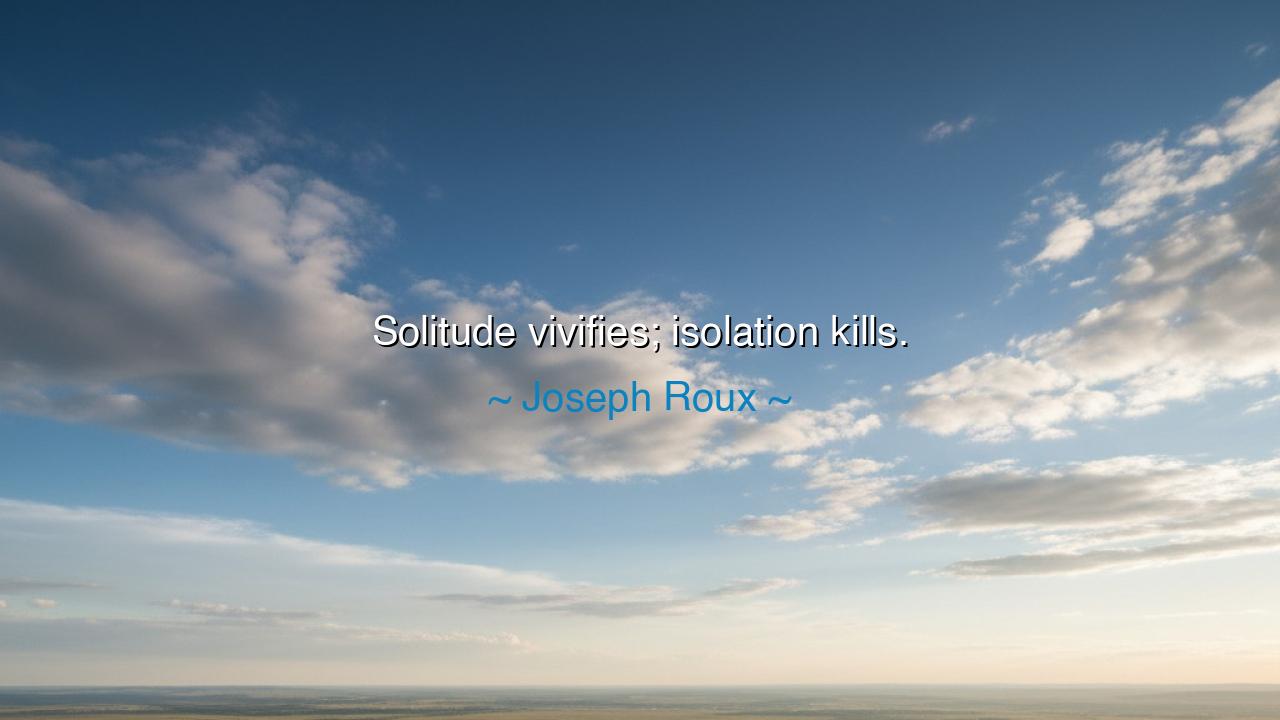
Solitude vivifies; isolation kills.






“Solitude vivifies; isolation kills.”
Thus wrote Joseph Roux, the French priest and poet whose reflections still echo through the corridors of time. In this brief yet powerful saying, he captures a truth that all seekers of wisdom must learn — that there is a sacred difference between solitude and isolation. One nourishes the soul; the other starves it. One opens the heart to the divine and to the self; the other closes it in upon its own despair. Solitude is a chosen stillness that brings life; isolation is an imprisonment of the spirit that drains it away. To know the difference between the two is to know how to live wisely in a world that never stops speaking.
To vivify is to bring life, to awaken what sleeps within. Solitude, then, is the art of renewal — the deliberate retreat from noise, where the mind can hear itself think and the heart can find its rhythm again. The ancients knew this secret. The prophets, the philosophers, the mystics — all sought solitude not as escape, but as transformation. In the silence of solitude, they met the eternal: the still voice of truth, the spark of inspiration, the fire of purpose. But when solitude turns into isolation — when one withdraws not to find peace, but to flee pain — the same silence becomes a tomb. Isolation kills because it cuts us off from the very currents of life that sustain us: love, connection, and the shared warmth of human fellowship.
Roux, a man of both faith and intellect, understood this balance deeply. Living in 19th-century France, he walked the line between contemplation and communion. In the quiet of the monastery, he saw how solitude could elevate the spirit — turning thought into prayer and loneliness into enlightenment. Yet he also witnessed how that same quiet could become a shadow, consuming those who shut themselves too tightly away from others. His words remind us that solitude is strength, but isolation is surrender — that to live fully, one must enter silence without abandoning the world.
Consider the story of Nelson Mandela, who spent twenty-seven long years in a prison cell. His solitude could have broken him; his isolation could have destroyed him. But Mandela chose to transform solitude into growth. He read, wrote, reflected, and turned inward not to escape reality, but to prepare his spirit for it. He emerged not hollow but radiant — a man strengthened by stillness, not shattered by it. His was the triumph of solitude over isolation, proof that even behind bars, the soul can remain free if it stays connected to purpose, to love, and to the dream of humanity.
In contrast, history also tells of those who let isolation consume them — thinkers, rulers, and artists who, unable to bear the weight of their own minds, shut themselves away until the light within them dimmed. Isolation feeds on fear, on pride, on the mistaken belief that we need no one. It turns the heart cold and the mind bitter. Solitude whispers, “Know yourself.” Isolation sneers, “You are all that matters.” The first births humility; the second breeds despair. Thus, Roux’s warning is not against silence, but against the silence that suffocates rather than sanctifies.
Solitude, when rightly lived, is communion with the eternal — a conversation with the soul and, through it, with the divine. It sharpens the senses, renews creativity, and fills the cup of the heart so it can be poured again into the world. Every great creation — every poem, invention, and revelation — has been born of a soul that dared to dwell alone for a time. But when that aloneness turns to bitterness, when one withdraws not for strength but from fear, the cup cracks. Isolation kills not by striking suddenly, but by drying the waters of compassion drop by drop.
The lesson of Roux’s words is clear and timeless: seek solitude as a wellspring, not as a wall. Go apart from the world to renew yourself, but always return with open hands. Walk alone beneath the stars, but remember that the light you see shines for all. Spend time in silence each day — to listen, to breathe, to think — yet do not let silence become an idol that replaces love. Speak when your heart overflows, but rest when your spirit tires.
And when you find yourself weary of the world, remember this truth: solitude vivifies; isolation kills. One makes you more human, the other less. So go into solitude as the ancients did — not to escape life, but to return to it more fully alive, carrying in your quiet heart the strength of peace, the clarity of purpose, and the warmth of the sun that rises even when no one else is watching.






AAdministratorAdministrator
Welcome, honored guests. Please leave a comment, we will respond soon